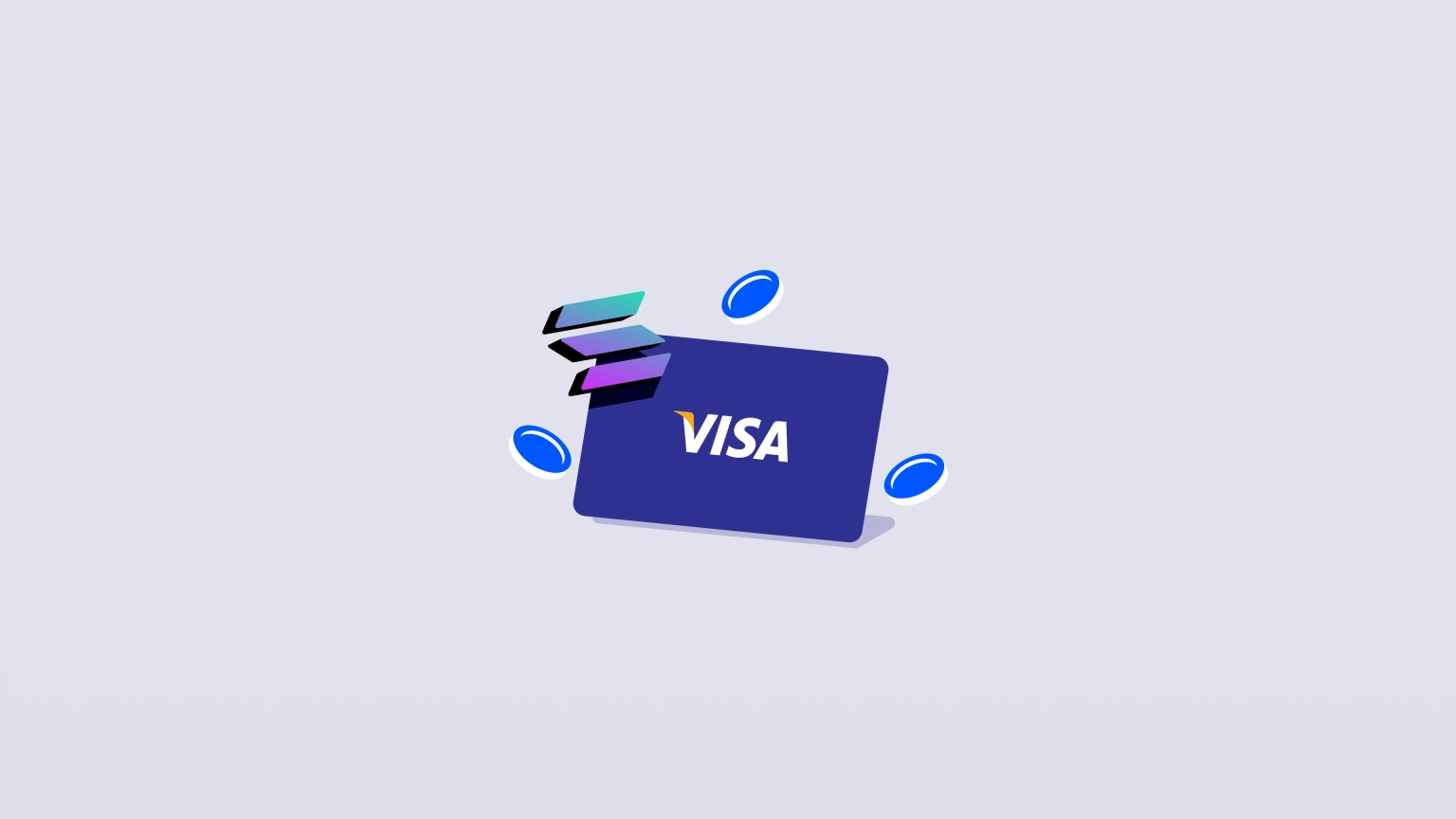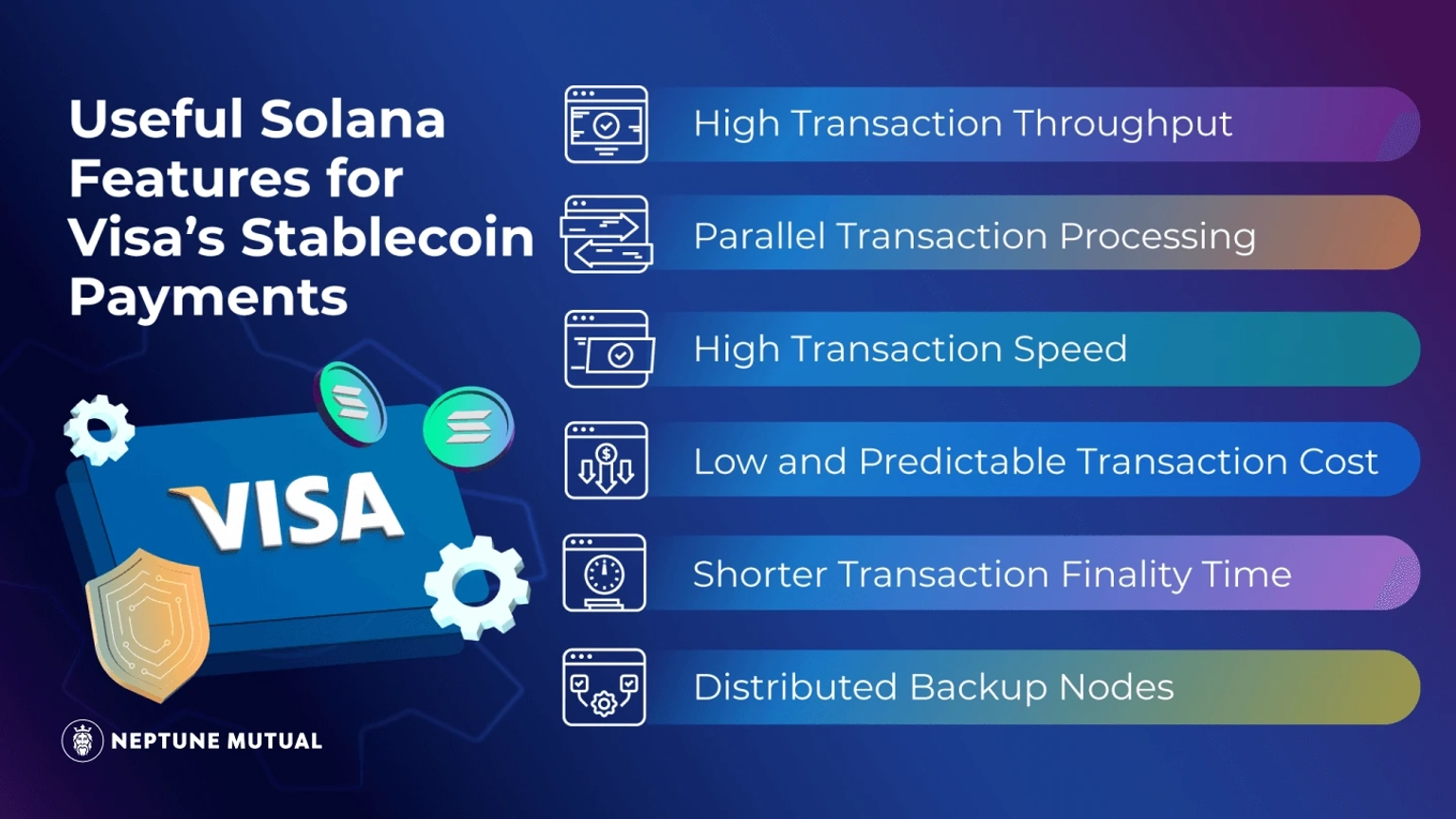
Collaboration between Neptune Mutual and SushiSwap
Explore Neptune Mutual's ongoing collaboration with SushiSwap offering several benefits.
Youtube Video
Playing the video that you've selected below in an iframe

An article explaining why Visa chose the Solana chain for testing stablecoin settlement.
Visa is one of the world's largest payment processing companies, handling over 240 billion transactions annually. The company has been closely following developments in the blockchain space and has recently announced a partnership with Solana to test the use of stablecoins for settlement.
Blockchain technology has the potential to revolutionize the payments industry by offering faster, cheaper, and more secure transactions. However, one of the biggest challenges facing blockchain-based payment systems is scalability.
Solana is a high-performance blockchain that can process thousands of transactions per second at a very low cost. This makes Solana a promising platform for stablecoin settlement, which requires the ability to handle a large volume of transactions quickly and efficiently.
In this post, we are discussing Visa test driving Solana and exploring its potential in stablecoin settlement.
1/🏦Breaking: Visa Expands Stablecoin Settlement Pilot to Solana@Visa is scaling their USDC settlement pilot to include the Solana blockchain, enabling enterprise-grade throughput at virtually no cost for Visa issuers and merchant acquirers on Solana. https://t.co/rF5ouZaISM
— Solana (@solana) September 5, 2023
Visa expanding its stablecoin settlement capabilities onto the Solana blockchain signals a significant shift in the global payments landscape. This move is set to revolutionize cross-border money transfers, with potential implications for the wider financial industry.
Visa's decision to collaborate with Solana seems to have stemmed from its impressive speed and processing capacity as compared to other conventional blockchain networks. Moreover, its low transaction fees offer cost-effective payment settlement, which seems appealing for a financial business.
Overall, Visa's choice to integrate Solana for its stablecoin settlement pilot underscores the blockchain's exceptional scalability, cost efficiency, and lightning-fast transaction speeds.
Let’s see the features of Solana that make it perfect for stablecoin payments in Visa.

Visa's interest in Solana stems from its exceptional transaction throughput, a key criterion essential for a payment processing giant like Visa.
While Solana may not have yet reached Visa's scale, it has demonstrated the capacity to handle an average of 400 user-generated transactions per second. It can surge to over 2,000 during peak periods, indicating its potential for testing and piloting payment use cases. This throughput significantly outperforms Ethereum, which averages 12 TPS, and Bitcoin, which manages around 7 TPS.
Solana's unique capability for parallel transaction processing serves as a foundational pillar for its high transaction throughput. Unlike single-threaded models, Solana's multi-threaded approach allows simultaneous execution of transactions impacting separate accounts, contributing to enhanced network efficiency.
This attribute makes Solana well-suited for supporting complex payment and settlement scenarios, ensuring smooth transactions even during periods of increased demand.
Transaction speed is crucial in the realm of digital payments. Solana's targeted slot time of 400 milliseconds, though occasionally ranging from 500 to 600 milliseconds, ensures rapid transaction confirmations. This not only facilitates efficient payment flows but also enhances the user experience.
In comparison, Ethereum users often face prolonged wait times due to gas fees and resource requirements for smart contract execution during network congestion, causing transaction confirmations to take minutes.
Another compelling aspect of Solana is its ability to maintain consistently low and predictable transaction costs. With transaction fees typically below $0.001, Solana stands out as an affordable option compared to the fluctuating and unpredictable fees of networks like Bitcoin and Ethereum.
The network's localized fee market prevents congestion in one account from affecting the transaction costs of other accounts, ensuring cost predictability and facilitating efficient cost management for payment companies and a seamless experience for users.
Solana's implementation of optimistic confirmation significantly reduces the time required for transaction finality.
There are many other blockchains that necessitate all validators' votes for block confirmation. Unlike that, Solana considers a block finalized if validators representing more than two-thirds of delegated stake validators have voted on it. This mechanism results in considerably shorter finality times compared to other blockchain networks, enhancing the overall efficiency of payment transactions.
The extensive presence of Solana's network across numerous diverse geographic locations serves to reinforce its robustness and dependability. With an impressive 1,893 active validators and an additional 925 nodes, Solana's network ensures continuous availability and seamless transaction initiation, even in the face of potential technical challenges or network disruptions.
Solana is committed to keeping the network resilient and redundant, which are important for keeping the payment ecosystem safe and stable. This is shown by the fact that nodes are spread out across more than 40 countries.
Visa's strategic foray into blockchain technologies not only serves the company's operational interests but also plays a significant role in catalyzing the adoption of Web3 technologies on a broader scale. Beyond its engagement with Solana, Visa has been actively involved in various Web3 initiatives, such as the Visa Creator program and the integration of the Ethereum Paymaster.
Recently, we have seen a handful of Web2 companies being associated with the blockchain and Web3 ecosystems. For example, Microsoft partnered with the Aptos chain for mutual benefits, and PayPal launched its native stablecoin, PYUSD.
The involvement of prominent industry players like Visa, Mastercard, PayPal, Microsoft, and so on, with blockchain technologies underscores the growing acceptance of Web3 and DeFi.
Visa's exploration in the blockchain space, regardless of the network used, instills a sense of security and credibility in the rapidly evolving digital economy. It can boost market confidence and may directly or indirectly favor DeFi spaces. As more users engage in DeFi, it increases the demand for risk management and coverage services like Neptune Mutual.
At Neptune Mutual, we offer parametric cover policies to users looking to protect their digital assets and funds invested in different protocols. We have a cover marketplace with cover pools in Ethereum, Arbitrum, and BNB Smart Chain, allowing users to purchase covers.
If you have a project in DeFi, CeFi, or Metaverse, you can create your own cover pools in our marketplace to protect your users from exploits. Reach out to us through our contact page if you are interested.
To learn more about Neptune Mutual, you can follow our X (Twitter) account and join our Discord channel.